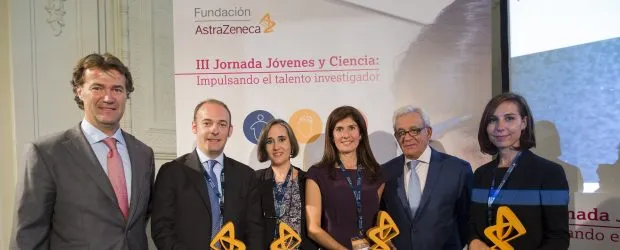The Astrazeneca Foundation has recognized the talent of four young Spanish scientists in the categories of 'type II diabetes and obesity', 'chronic obstructive pulmonary disease (COPD)', 'oncology' and 'acute coronary syndrome (SCA)', throughScholarships worth 80,000 euros during the delivery of the III Young Researchers Awards, at a gala held at the Carlos III (ISCIII) Health Institute in Madrid.
The Director of the Genic Expression Laboratory of the Salk Institute of Biological Studies in the American city of San Diego, Dr. Juan Carlos Izpisúa, stressed that “the talent of young Spanish scientists is key to the future and progress, and awards such as theof the Astrazeneca Foundation help boost it inside and outside our borders. ”
On these awards, the president of the Foundation, Eduardo Recoder, said that "they have consolidated as a reference in science.""We are proud to be able to affirm that they have the support, both of the scientific community, as well as researchers of recognized prestige," he said.
Four awarded
The winner in the category of 'Type II and Obesity Diabetes' was Dr. Dora Romaguera, for her research' Predimed+DM: effect of a hypocaloric Mediterranean diet and promotion of physical activity in the prevention of type II diabetes in people with people with people with peopleMetabolic Syndrome ', which he developed at the Son Espases University Hospital in Palma de Mallorca and at the Illes Balearicas Research Institute Foundation (IDisba).
The awarded in the category of 'Chronic Obstructive Pulmonary Disease (COPD)' was Elisabeth Córdoba, for her research 'Sennescent MirnaOur Lady of Candelaria, in Santa Cruz de Tenerife.
In the category of 'oncology' the awarded was Dr. Aleix Prat, for his research on the 'Study of the HER2ENRIQUE POBNOTYPE IN BREAST BREAST HER2-NEGATIVA', which he carried out at the Institute of Biomedical Research August Pi i Sunyer (IDIBAPS) ofBarcelona.
Dr. María Téllez was the winner in the category of 'Acute Coronary Syndrome (SCA)', for her research on the 'genetically high concentrations of metals, methylation of the DNA and the acute coronary syndrome: an epidemiological study of Mendelian randomization', which, whichHe carried out at the Health Research Institute of the University Clinical Hospital of Valencia (Incliva).
On the other hand, the Astrazeneca Foundation recognized the excellence of the scientific career of the Neurology Service of the HM Sanchinarro Hospital in Madrid, Dr. José Ángel Obeso, when he granted the I Honorary Prize.The neurologist said that “investigating to stop neurodegenerative diseases is an imperative need of the 21st century.Or we stop them, or stop us. ”


